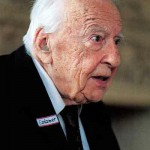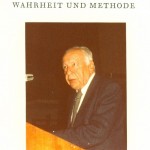Catholic Hermeneutics: The Theology of Tradition and the Philosophy of Hans-Georg Gadamer
A dissertation by Mark F. Fischer presented to the Faculty of the Graduate Theological Union in Partial Fulfillment of the Requirements for the Degree of Doctor of Philosophy. Berkeley, CA, December 12, 1983.
To view the dissertation as a series of PDFs, click here.
In 1984, I completed my Ph.D. dissertation at Berkeley’s Graduate Theological Union. I was 33 years old, married, and with two young children. The dissertation had been typed over the course of three years on a Selectric typewriter. The pages sat in a box for 22 years until I was able to scan them digitally. In the fall of 2006, St. John’s Seminary granted me a sabbatical in Morelia, Michoacán, where I was able to edit the text of 1984, turning it into a word-processing document faithful to the original typescript.
Today, as I re-read the dissertation, I understand better what it meant to me then and what it means to me now. On the surface, Catholic Hermeneutics attempted to show how the philosophy of Hans-Georg Gadamer illuminated the theology of tradition. I had first encountered Gadamer’s Truth and Method in English, during a 1977 GTU seminar led by Michael Buckley, SJ.
In 1979, I spent a year at the University of Tübingen, where I heard Gadamer give a lecture on “Mathematik und Dialektik bei Platon.” When I returned from Germany, the outline for my dissertation was complete. While writing it in California, I had the pleasure of hearing Gadamer three times in Berkeley and Davis, which he visited in 1981 or 1982.
The theology of tradition, in brief, expresses the Catholic faith that the incarnation of the Word was the decisive point in human history, the point at which God’s will for human beings culminated. The mission of Jesus was entrusted to the hands of Christians, who as the Church continue his mission to this day. In that way they pass on the Christian tradition.
Since the 18th-century Enlightenment and even before, however, critics have cast doubt on the very possibility of God’s entry into human history. Their critique usually takes the form of philosophical skepticism. It unfavorably compares the Church’s claims with its failures and draws the conclusion of Nietzsche, namely, that every past (including the Christian past) is worth condemning. Catholic Hermeneutics repudiates that philosophic skepticism. Instead it maintains the thesis of philosophical idealism, of whom Gadamer was an exponent. That is the thesis that it is possible to know the truth and express it, however imperfectly. The perennial task of the humanities is to cultivate the expressions of truth, probing their relevance for today, and Gadamer called this task “philosophical hermeneutics.”
Gadamer’s philosophy illuminates the theology of tradition, I believe, by enabling Catholic readers to better understand what the expositors of that theology mean. First of all, philosophical hermeneutics teaches that the task of the humanities is not to define criteria by which to judge the truth or falsehood of the objects of tradition. It is rather to cultivate those objects, starting from the presupposition that the objects have something worthwhile to offer. This insight suggests that the distinction (common to the theology of tradition) between active and objective tradition is less a distinction than a unity-in-difference. We know the objects of tradition in terms of their effect on us, that is, in the activity of interpreting them and applying them to our lives.
Philosophical hermeneutics also teaches (in the second place) that the interpretation of historical phenomena takes place within a context – historical life itself – which is always unfolding. This acknowledgment sheds a particular light on the interpretation of the history of Christianity. For Christians, the event of Jesus Christ and its culmination in his return provide the context, an anticipated context, for the interpretation of this or that historical moment. The context continues to unfold. The historical traditions unfold within the dogmatic tradition – the passing on of faith – as it is transmitted by Christian believers. When we interpret the dogmas that tradition has bequeathed, our interpretation takes place within that dogmatic tradition, a tradition that cannot be reduced to an empirical analysis of this or that historical event, teaching, or document.
Gadamer’s philosophy (to give a final example) indirectly reminds Catholic Christians that the doctrine of the Council of Trent – that the saving truth of the gospel is contained in Scripture and Tradition – does not mean partly in one and partly in the other. No, it means that the truth rests in the union of the two, Scripture rightly interpreted by the bearers of tradition, and tradition informed by the cultivation of Biblical studies. Gadamer was a Protestant Christian, shaped by the culture of Lutheran Scriptural hermeneutics as much as by a life-long study of philosophy from the Greeks to German idealism. He recognized that some interpretations are better – more authoritative – than others. The Reformers argued that the Scriptures are sufficient for salvation, provided that they are rightly interpreted. Catholics concede that the Scriptures have a “material” sufficiency, again, provided that they are correctly understood. Rightly interpreted, they are not just materially sufficient, but formally sufficient as well. To read a brief summary of the four parts of the dissertation, click below:
- I. Hans-Georg Gadamer and the Decline of Tradition
- II. The Philosophical Rehabilitation of Tradition
- III. A Reconsideration of the Modern Theology of Tradition
- IV. Catholic Hermeneutics
Gadamer’s indirect contribution to the theology of tradition was the explicit topic of my doctoral dissertation. As I look back on it in 2006, however, I realize that the dissertation was more than it explicitly said. It was also an effort to free myself from the illusion, which can be traced back to the Enlightenment, that the individual can be entirely objective and rational. It was an acknowledgement that we human beings are caught up in the currents of history, currents not of our choosing. I realized that, when I “did hermeneutics” as a theologian, I did them as “Catholic hermeneutics,” as an expression of the faith I held and hold. The currents of life bear us along and grant us possibilities and opportunities which, when we accept or reject them, define our lives. The Christian interprets these currents as providence, a gift of God, wherein the relation between humanity and divinity grows.


